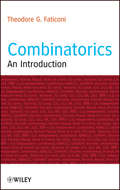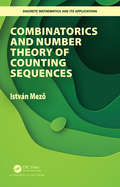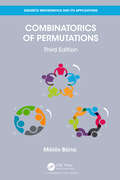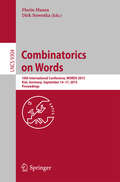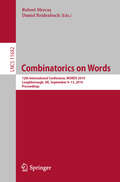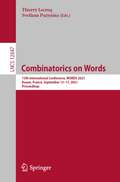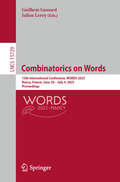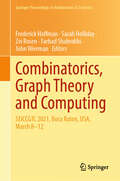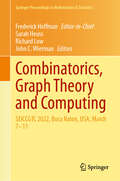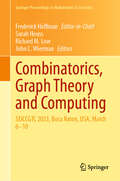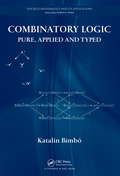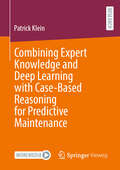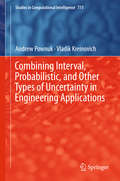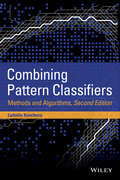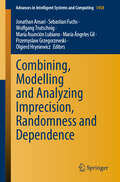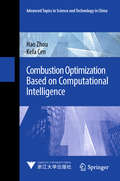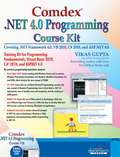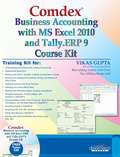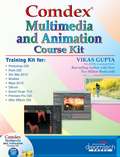- Table View
- List View
Combinatorics
by Theodore G.FaticoniBridges combinatorics and probability and uniquely includes detailed formulas and proofs to promote mathematical thinking Combinatorics: An Introduction introduces readers to counting combinatorics, offers examples that feature unique approaches and ideas, and presents case-by-case methods for solving problems. Detailing how combinatorial problems arise in many areas of pure mathematics, most notably in algebra, probability theory, topology, and geometry, this book provides discussion on logic and paradoxes; sets and set notations; power sets and their cardinality; Venn diagrams; the multiplication principal; and permutations, combinations, and problems combining the multiplication principal. Additional features of this enlightening introduction include: Worked examples, proofs, and exercises in every chapter Detailed explanations of formulas to promote fundamental understanding Promotion of mathematical thinking by examining presented ideas and seeing proofs before reaching conclusions Elementary applications that do not advance beyond the use of Venn diagrams, the inclusion/exclusion formula, the multiplication principal, permutations, and combinations Combinatorics: An Introduction is an excellent book for discrete and finite mathematics courses at the upper-undergraduate level. This book is also ideal for readers who wish to better understand the various applications of elementary combinatorics.
Combinatorics and Number Theory of Counting Sequences (Discrete Mathematics and Its Applications)
by Istvan MezoCombinatorics and Number Theory of Counting Sequences is an introduction to the theory of finite set partitions and to the enumeration of cycle decompositions of permutations. The presentation prioritizes elementary enumerative proofs. Therefore, parts of the book are designed so that even those high school students and teachers who are interested in combinatorics can have the benefit of them. Still, the book collects vast, up-to-date information for many counting sequences (especially, related to set partitions and permutations), so it is a must-have piece for those mathematicians who do research on enumerative combinatorics. In addition, the book contains number theoretical results on counting sequences of set partitions and permutations, so number theorists who would like to see nice applications of their area of interest in combinatorics will enjoy the book, too. Features The Outlook sections at the end of each chapter guide the reader towards topics not covered in the book, and many of the Outlook items point towards new research problems. An extensive bibliography and tables at the end make the book usable as a standard reference. Citations to results which were scattered in the literature now become easy, because huge parts of the book (especially in parts II and III) appear in book form for the first time.
Combinatorics of Permutations (Discrete Mathematics and Its Applications)
by Miklos BonaA CHOICE "Outstanding Academic Title," the first edition of this bestseller was lauded for its detailed yet engaging treatment of permutations. Providing more than enough material for a one-semester course, Combinatorics of Permutations, third edition continues to clearly show the usefulness of this subject for both students and researchers. The research in combinatorics of permutations has advanced rapidly since this book was published in a first edition. Now the third edition offers not only updated results, it remains the leading textbook for a course on the topic. Coverage is mostly enumerative, but there are algebraic, analytic, and topological parts as well, and applications. Since the publication of the second edition, there is tremendous progress in pattern avoidance (Chapters 4 and 5). There is also significant progress in the analytic combinatorics of permutations, which will be incorporated. •A completely new technique from extremal combinatorics disproved a long-standing conjecture, and this is presented in Chapter 4. •The area of universal permutations has undergone a lot of very recent progress, and that has been noticed outside the academic community as well. This also influenced the revision of Chapter 5. •New results in stack sorting are added to Chapter 8. •Chapter 9 applications to biology has been revised. The author’s other works include Introduction to Enumerative and Analytic Combinatorics, second edition (CHOICE "Outstanding Academic Title") and Handbook of Enumerative Combinatorics, published by CRC Press. The author also serves as Series Editor for CRC’s Discrete Mathematics and Its Applications.
Combinatorics on Words: 10th International Conference, WORDS 2015, Kiel, Germany, September 14-17, 2015, Proceedings (Lecture Notes in Computer Science #9304)
by Florin Manea Dirk NowotkaThis book constitutes the refereed proceedings of the 10th International Conference on Combinatorics on Words, WORDS 2015, held in Kiel, Germany, in September 2015 under the auspices of the EATCS. The 14 revised full papers presented were carefully reviewed and selected from 22 submissions. The main object in the contributions are words, finite or infinite sequences of symbols over a finite alphabet. The papers reflect both theoretical contributions related to combinatorial, algebraic, and algorithmic aspects of words, as well as to contributions presenting applications of the theory of words in other field of computer science, linguistics, biology, bioinformatics, or physics.
Combinatorics on Words: 12th International Conference, WORDS 2019, Loughborough, UK, September 9–13, 2019, Proceedings (Lecture Notes in Computer Science #11682)
by Robert Mercaş Daniel ReidenbachThis book constitutes the refereed proceedings of the 12th International Conference on Combinatorics on Words, WORDS 2019, held in Loughborough, UK, in September 2019. The 21 revised full papers presented in this book together with 5 invited talks were carefully reviewed and selected from 34 submissions. WORDS is the main conference series devoted to the mathematical theory of words. In particular, the combinatorial, algebraic and algorithmic aspects of words are emphasized. Motivations may also come from other domains such as theoretical computer science, bioinformatics, digital geometry, symbolic dynamics, numeration systems, text processing, number theory, etc.
Combinatorics on Words: 13th International Conference, WORDS 2021, Rouen, France, September 13–17, 2021, Proceedings (Lecture Notes in Computer Science #12847)
by Thierry Lecroq Svetlana PuzyninaThis book constitutes the refereed proceedings of the 13th International Conference on Combinatorics on Words, WORDS 2021, held virtually in September 2021. The 14 revised full papers presented in this book together with 2 invited talks were carefully reviewed and selected from 18 submissions. WORDS is the main conference series devoted to the mathematical theory of words. In particular, the combinatorial, algebraic and algorithmic aspects of words are emphasized. Motivations may also come from other domains such as theoretical computer science, bioinformatics, digital geometry, symbolic dynamics, numeration systems, text processing, number theory, etc.
Combinatorics on Words: 15th International Conference, WORDS 2025, Nancy, France, June 30 – July 4, 2025, Proceedings (Lecture Notes in Computer Science #15729)
by Julien Leroy Guilhem GamardThis book constitutes the refereed proceedings of the 15th International Conference on Combinatorics on Words, WORDS 2025, held in Nancy, France, during June 30– July 4, 2025. The 20 papers included in these proceedings were carefully reviewed and selected from 31 submissions. They focus on mathematical theory of words. In particular, the combinatorial, algebraic and algorithmic aspects of words are emphasized.
Combinatorics, Graph Theory and Computing: SEICCGTC 2021, Boca Raton, USA, March 8–12 (Springer Proceedings in Mathematics & Statistics #448)
by Sarah Holliday Frederick Hoffman Zvi Rosen Farhad Shahrokhi John WiermanThis proceedings volume convenes selected, revised papers presented at the 52nd Southeastern International Conference on Combinatorics, Graph Theory and Computing (SEICCGTC 2021), virtually held at Florida Atlantic University in Boca Raton, USA, on March 8-12, 2021. As has been a tradition since its inception in 1970, this edition once more brought together mathematicians, practitioners, and scientists around novel findings in combinatorics, graph theory and computing, and their interactions.The lectures and works presented at the Conference have proven to be of great interest to other scientists and analysts employing these mathematical sciences in their professional activities in business, industry, and government. Such an environment promotes a better understanding of the roles of modern applied mathematics, combinatorics, and computer science. Many works have demonstrated that disciplines have increasingly contributed to each other. With this series of Conferences, the gaps between the fields tend to decrease even further.This volume is of particular interest for the community of pure and applied mathematicians in academia, industry, and government, working in combinatorics and graph theory, as well as related areas of computer science and the interactions among these fields. Its findings can also benefit a general audience of practitioners and students from related fields.
Combinatorics, Graph Theory and Computing: SEICCGTC 2022, Boca Raton, USA, March 7–11 (Springer Proceedings in Mathematics & Statistics #462)
by Frederick HoffmanThis proceedings volume compiles selected, revised papers presented at the 53rd SouthEastern International Conference on Combinatorics, Graph Theory, and Computing (SEICCGTC 2022), which took place at Florida Atlantic University in Boca Raton, USA, from March 7th to 11th, 2022. The SEICCGTC is widely regarded as a trendsetter for other conferences worldwide. Many ideas and themes initially discussed here have subsequently been explored in other conferences and symposia. Since 1970, the conference has been held annually in Baton Rouge, Louisiana, and Boca Raton, Florida. Over the years, it has grown to become the primary annual conference in its fields, playing a crucial role in disseminating results and fostering collaborative work. This volume is tailored for the community of pure and applied mathematicians in academia, industry, and government, who work in combinatorics and graph theory, as well as related areas of computer science and the intersections among these fields.
Combinatorics, Graph Theory and Computing: SEICCGTC 2023, Boca Raton, USA, March 6–10 (Springer Proceedings in Mathematics & Statistics #489)
by Frederick HoffmanThis proceedings volume compiles selected, revised papers presented at the 54th Southeastern International Conference on Combinatorics, Graph Theory, and Computing (SEICCGTC 2023), which took place at Florida Atlantic University in Boca Raton, USA, from March 6th to 10th, 2023. The SEICCGTC is widely regarded as a trendsetter for other conferences worldwide. Many ideas and themes initially discussed here have subsequently been explored in other conferences and symposia. Since 1970, the conference has been held annually in Baton Rouge, Louisiana, and Boca Raton, Florida. Over the years, it has grown to become the primary annual conference in its fields, playing a crucial role in disseminating results and fostering collaborative work. This volume is tailored for the community of pure and applied mathematicians in academia, industry, and government, who work in combinatorics and graph theory, as well as related areas of computer science and the intersections among these fields.
Combinatorics, Words and Symbolic Dynamics
by Valérie Berthé Michel RigoInternationally recognised researchers look at developing trends in combinatorics with applications in the study of words and in symbolic dynamics. They explain the important concepts, providing a clear exposition of some recent results, and emphasise the emerging connections between these different fields. Topics include combinatorics on words, pattern avoidance, graph theory, tilings and theory of computation, multidimensional subshifts, discrete dynamical systems, ergodic theory, numeration systems, dynamical arithmetics, automata theory and synchronised words, analytic combinatorics, continued fractions and probabilistic models. Each topic is presented in a way that links it to the main themes, but then they are also extended to repetitions in words, similarity relations, cellular automata, friezes and Dynkin diagrams. The book will appeal to graduate students, research mathematicians and computer scientists working in combinatorics, theory of computation, number theory, symbolic dynamics, tilings and stringology. It will also interest biologists using text algorithms.
Combinatory Logic: Pure, Applied and Typed (Discrete Mathematics and Its Applications)
by Katalin BimboCombinatory logic is a versatile field that is connected to philosophical, mathematical, and computational logic. This comprehensive reference on combinatory logic covers results in the field from the last four decades along with classical information on the topic. The author makes combinatory logic simple to understand while providing working knowledge that is rigorous, current, and readable. Reader-friendly without compromising the precision of exposition, the book includes many new research results not found in the available literature. It also contains pointers to new directions in the field that can be pursued further by researchers.
Combining Expert Knowledge and Deep Learning with Case-Based Reasoning for Predictive Maintenance
by Patrick KleinIf a manufacturing company's main goal is to sell products profitably, protecting production systems from defects is essential and has led to vast documentation and expert knowledge. Industry 4.0 has facilitated access to sensor and operational data across the shop floor, enabling data-driven models that detect faults and predict failures, which are crucial for predictive maintenance to minimize unplanned downtimes and costs. Commonly, a universally applicable machine learning (ML) approach is used without explicitly integrating prior knowledge from sources beyond training data, risking incorrect rediscovery or neglecting already existing knowledge. Integrating expert knowledge with ML can address the scarcity of failure examples and avoid the learning of spurious correlations, though it poses technical challenges when combining Semantic Web-based knowledge graphs with neural networks (NNs) for time series data. For his research, a physical smart factory model with condition monitoring sensors and a knowledge graph was developed. This setup generated the required data for exploring the integration of expert knowledge with (Siamese) NNs for similarity-based fault detection, anomaly detection, and automation of root cause analysis. Patrick Klein applied symbolic and sub-symbolic AI techniques, demonstrating that integrating expert knowledge with NNs enhances prediction performance and confidence in them while reducing the number of learnable parameters and failure examples.
Combining Interval, Probabilistic, and Other Types of Uncertainty in Engineering Applications (Studies In Computational Intelligence #773)
by Vladik Kreinovich Andrew PownukHow can we solve engineering problems while taking into account data characterized by different types of measurement and estimation uncertainty: interval, probabilistic, fuzzy, etc.? This book provides a theoretical basis for arriving at such solutions, as well as case studies demonstrating how these theoretical ideas can be translated into practical applications in the geosciences, pavement engineering, etc.In all these developments, the authors’ objectives were to provide accurate estimates of the resulting uncertainty; to offer solutions that require reasonably short computation times; to offer content that is accessible for engineers; and to be sufficiently general - so that readers can use the book for many different problems. The authors also describe how to make decisions under different types of uncertainty.The book offers a valuable resource for all practical engineers interested in better ways of gauging uncertainty, for students eager to learn and apply the new techniques, and for researchers interested in processing heterogeneous uncertainty.
Combining Pattern Classifiers
by Ludmila I. KunchevaCombined classifiers, which are central to the ubiquitous performance of pattern recognition and machine learning, are generally considered more accurate than single classifiers. In a didactic, detailed assessment, Combining Pattern Classifiers examines the basic theories and tactics of classifier combination while presenting the most recent research in the field. Among the pattern recognition tasks that this book explores are mail sorting, face recognition, signature verification, decoding brain fMRI images, identifying emotions, analyzing gene microarray data, and spotting patterns in consumer preference. This updated second edition is equipped with the latest knowledge for academics, students, and practitioners involved in pattern recognition fields.
Combining, Modelling and Analyzing Imprecision, Randomness and Dependence (Advances in Intelligent Systems and Computing #1458)
by Sebastian Fuchs María Ángeles Gil Olgierd Hryniewicz Przemyslaw Grzegorzewski Wolfgang Trutschnig María Asunción Lubiano Jonathan AnsariThis volume contains more than 65 peer-reviewed papers corresponding to presentations at the 11th Conference on Soft Methods in Probability and Statistics (SMPS) held in Salzburg, Austria, in September 2024. It covers recent advances in the field of probability, statistics, and data science, with a particular focus on dealing with dependence, imprecision and incomplete information. Reflecting the fact that data science continues to evolve, this book serves as a bridge between different groups of experts, including statisticians, mathematicians, computer scientists, and engineers, and encourages interdisciplinary research. The selected contributions cover a wide range of topics such as imprecise probabilities, random sets, belief functions, possibility theory, and dependence modeling. Readers will find discussions on clustering, depth concepts, dimensionality reduction, and robustness, reflecting the conference's commitment to addressing real-world challenges through innovative methods.
Combustion Optimization Based on Computational Intelligence (Advanced Topics in Science and Technology in China)
by Hao Zhou Kefa CenThis book presents the latest findings on the subject of combustion optimization based on computational intelligence. It covers a broad range of topics, including the modeling of coal combustion characteristics based on artificial neural networks and support vector machines. It also describes the optimization of combustion parameters using genetic algorithms or ant colony algorithms, an online coal optimization system, etc. Accordingly, the book offers a unique guide for researchers in the areas of combustion optimization, NOx emission control, energy and power engineering, and chemical engineering.
Comdex .NET 4.0 Programming Course Kit
by Vikas GuptaThe book is an all-new approach to programming with VB 2010 and C# 2010 for Web and Window-based applications. These two applications are widely used by those aspiring students who wish to build their career in the field of .NET programming. This book is for upcoming professionals looking for career opportunity in the field of .NET programming as well as for professionals who want to upgrade their skills by learning new versions of applications used in the field of .NET programming. The book covers VB 2010, C# 2010, and ASP.NET 4.0 applications in an easy-to-understand language supported by ample screenshots and real life Scenarios. The content of the book goes in adequate detail covering all the aspects of .NET programming.
Comdex Business Accounting
by Vikas GuptaThe book is a combination of two popular applications in their latest version, MS Excel 2010 and Tally.ERP 9. These two applications are widely used across small as well as large business houses and accounting firms. Vikas Gupta has devised the book for upcoming professionals looking for career opportunity in the field of finance and accounts management as well as for professionals who want to upgrade their skills by learning new versions of applications used in the field of business accounting.The book covers MS Excel 2010 and Tally.ERP 9 applications in an easy to understand language supported by ample screenshots and real life scenarios. The book helps you to master business accounting with the help of MS Excel 2010 and Tally.ERP 9 applications.
Comdex Multimedia and Animation
by Vikas GuptaComdex Multimedia And Animation Course Kit Author: Vikas Gupta
Comdex® Computer Course Kit: Windows 7 with Office 2010
by Vikas GuptaThe book covers all new features and programs of Windows, such as Internet Explorer, Outlook, etc. The book does not end here; after mastering Windows 7, the book introduces you to Microsoft Office 2010 and helps you in preparing professional letters, personal accounting sheets, presentations, databases and composing emails. Inside the Book: Computer Fundamentals Windows 7 Microsoft Word 2010 Microsoft Excel 2010 Microsoft Access 2010 Microsoft PowerPoint 2010 Microsoft Outlook 2010 The unique Tutor CD provided along with this book is a true add-on. While other books rely on theory and long explanations, the tutor CD accompanying this book helps you build skills on the software you have learned while reading the book.
Come Creare, Promuovere e Vendere Ebook - A Costo Zero
by Jason Matthews Giuseppe ChiodiTutto per gli scrittori che vendono ebook. L'editoria elettronica (o e-publishing) consente agli autori indipendenti di trattenere il grosso dei diritti. Scoprite i modi migliori per: *usare i social media -- costruire una presenza online *formattare e caricare su Amazon, Narcissus, Smashwords, Barnes & Noble, Apple, Google e altri *convertire documenti in qualsiasi formato (epub, mobi, pdf e altri) *vendere libri online *creare un sito web funzionale *creare un fantastico blog *ideare copertine per ebook *scalare le classifiche col SEO (search engine optimization) su Google-Bing *vendere ebook con PayPal dai vostri stessi siti automaticamente *creare libri cartacei *usare le PR (pubbliche relazioni) per generare traffico *e molto altro Ricco di informazioni, esempi, con oltre 250 link a siti e software per realizzare i vostri obiettivi sui rivenditori e sui vostri siti web. Adatto ai principianti e utile agli esperti a cui farebbero comodo delle indicazioni in più. Come dieci libri in uno, la sola e unica fonte di cui avrete bisogno per avere successo.
Come Disdire Il Tuo Abbonamento a Netflix Online: Questa guida ti insegnerà a disdire l'abbonamento o la prova Netflix in meno di un minuto!
by Dan Gaines-Passaggi dettagliati e facili da seguire -Risparmia tempo per capirlo da solo -Risparmia tempo senza dover passare ore a contattare l'assistenza -Annulla in pochissimo tempo senza problemi Fai clic sul pulsante "Acquista ora" per accedervi immediatamente! Disclaimer: Questo autore e/o il proprietario dei diritti non fanno rivendicazioni, promesse o garanzie in merito all'accuratezza, completezza o adeguatezza dei contenuti di questo libro e declinano espressamente la responsabilità per errori e omissioni nei contenuti all'interno. Questo prodotto è destinato al solo utilizzo come riferimento. Genere: COMPUTER / Hardware / Generale Genere secondario: COMPUTER / Hardware / Hardware di rete Lingua: Italiana Parole chiave: netflix, disdici, come fare, passaggi, prezzo, offerta, iscrizione, account, abbonamento, annuale, addebito, contatto, supporto, app, online Conteggio parole: 3000 Link libri: Amazon
Come Sbloccare Fire TV & TV Stick: La Guida Completa
by Rob StiegelmanCome sbloccare Fire TV & TV Stick: la guida completa Una volta effettuato il jailbreak e aver installato Kodi sui vostri dispositivi Fire TV, avrete finalmente accesso a qualsiasi serie TV, musica o film desideriate. Contenuti del libro: Tutto ciò che c’è da sapere di Kodi su Firestick Come installare Kodi & come effettuare il jailbreaking della Firestick TV – valido per tutti i dispositivi Risoluzione problemi Godetevi l’accesso a film, musica, serie TV, Apps e molto altro! --> Cliccate “aggiungi al carrello” per comprare immediatamente questo libro Disclaimer: L'autore o il proprietario dei diritti non sostengono ne fanno promesse o garanzie sull’esattezza, esaustività o adeguatezza dei contenuti del libro e negano responsabilità per qualsiasi errore e omissione contenuta nel libro. Questo prodotto è inteso esclusivamente come materiale di riferimento personale.
Come Scrivere un eBook in un Mese: Passaggi e Consigli per Concentrarsi, Motivarsi ed Essere Creativi
by Beautrice NorfolkVuoi scrivere un libro senza fatica e impiegando poco tempo? Che aspetti? Scopri subito strategie e consigli che autori e autrici di best seller utilizzano per scrivere i propri capolavori! Leggendo, imparerai a: - Scrivere un Libro in Un Mese o Meno! - Scrivere le Scene Iniziali. - Impostare una Scena. - Sviluppare una Struttura. - Creare Idee. - Mantenere la Concentrazione. >>> Clicca qui per acquistare immediatamente!
